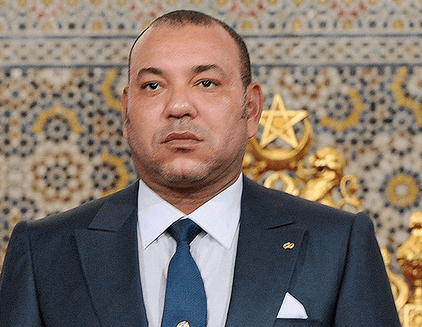Profile of visiting Moroccan King Mohammed VI

King Mohammed VI of Morocco was the second child and oldest son of King Hassan II with his second wife, Lalla Latifa Hammou.
On the day of his birth, Mohammed was appointed the Heir Apparent and Crown Prince to the King.
His father was keen on giving him a religious and political education at an early age. At age four, he started attending the Qur’anic School at the Royal Palace.
He completed his primary and secondary education at the Royal College and attained his Baccalaureate in 1981, before gaining a Bachelor’s Degree in Law at the Mohammed V University at Agdal in 1985.
His research paper dealt with “The Arab-African Union and the Strategy of the Kingdom of Morocco in matters of International Relations.”
He has also frequented the Imperial College and University of Rabat and was later appointed President of the Pan Arab Games and commissioned as a Colonel Major of the Royal Moroccan Army on November 26, 1985.
He served as the Co-ordinator of the Offices and Services of the Royal Armed Forces until 1994. In 1987, Mohammed obtained his first Certificat d’Études Supérieures (CES) in Political Sciences in July 1988 and obtained a Diplôme d’Études Approfondies (DEA) in Public Law.
In November 1988, he trained in Brussels with Jacques Delors, then President of the European Commission.
King Mohammed obtained his PhD in Law with Distinction on 29th October, 1993 from the French University of Nice, Sophia Antipolis, for his thesis on “EEC-Maghreb Relations”.
On 12th July 1994, he was promoted to the military rank of Major General, and later that same year became President of the High Council of Culture and Commander-in-Chief of the Royal Moroccan Army.
Social Reforms and Liberalisation Policies
Shortly after ascending the throne on 30th July, 1999, King Mohammed VI addressed his nation via television and promised to alleviate poverty and stamp out corruption.
He also promised to create jobs and improve Morocco’s human rights record, however, his reformist rhetoric was strongly opposed by Islamist conservatives and some of his reforms angered fundamentalists.
In February 2004, he enacted a new family code, or Mudawana, which granted women more power. Women were guaranteed “civic and social” equality with men. Previously, only “political equality” was guaranteed, though the 1996 Constitution granted all citizens equality in terms of rights before the law.
The King retains complete control over the armed forces and the judiciary as well as matters pertaining to religion and foreign policy; and also retains the authority to appoint and dismiss prime ministers.
Morocco practises parliamentary constitutional monarchy, however, criticising or directly opposing the king is still punishable with imprisonment.
Source: GNA
